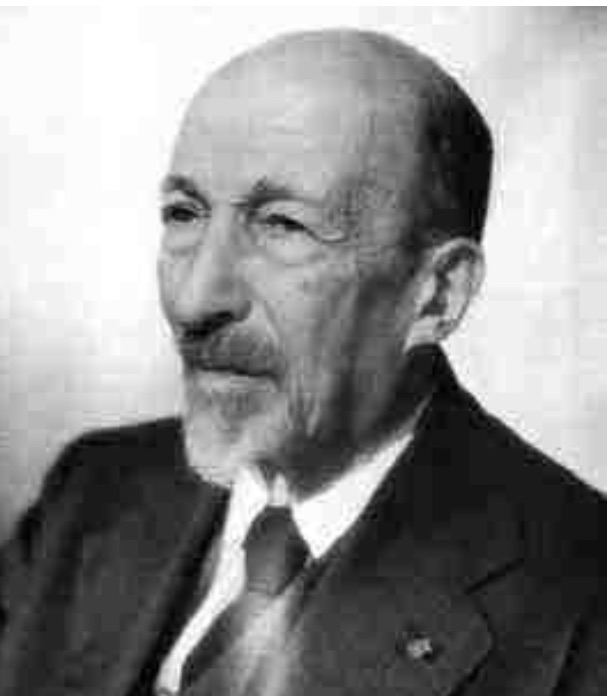
Jacques Salomon Hadamard was born on December 8, 1865, in Versailles, France. He grew up in an educated family. His father, Amédée Hadamard taught classics, grammar, history and geography at the Lycée Charlemagne in Paris and his mother, Claire, Marie Jeanne Picard gave private piano lessons in their home. When Jacques was 4 years of age, the Franco-Prussian War erupted and Paris was under siege. Food was scarce and people were killing and eating their domestic pets to survive. The Hadamard family survived on elephant meat. Shortly after France conceded defeat in 1871 and signed the Treaty of Frankfurt, a civil war broke out in Paris and the Hadamard family home was burned down. Between 1870 and 1874 both of Jacques Hadamard’s younger sisters died.
Jacques began his early schooling at the Lycée Charlemagnein where his father was teaching. He excelled in Greek and Latin but his aptitude for mathematics did not emerge until the seventh grade. He would later recall his difficulties stating, “To parents who despair because their children are unable to master the first problems in arithmetic, I can dedicate my example. For in arithmetic, until the seventh grade I was last or nearly last.” In 1876 Jacques transferred to the Lycée Louis-le-Grand and in 1882 graduated Bachelier ès lettres et ès sciences. The next year, he received his Baccalauréat ès sciences, receiving first prize in algebra and first prize in mechanics in the Concours Général of 1883. The following year, Jacques entered the École Normale Supérieure in Paris.
At the École Normale Supérieure, Hadamard received instruction from a cadre of prominent mathematicians, including Hermite, Darboux, Picard and Tannery. In 1892, after his 8-year immersion in a comprehensive study of mathematics, he was awarded his doctorate for his thesis on continued fractions. Later that year, he was awarded the Grand Prix des Sciences Mathématiques for his investigation of the Riemann zeta function. The next year, he began a lectureship at the University of Bordeaux, where he discovered his famous inequality on determinants that led to the concept of what are now called “Hadamard matrices.” These are square matrices whose entries are either +1 or -1 and whose rows are mutually orthogonal. They have applications in various areas, including signal processing and coding theory.
In 1896, Hadamard, proved the Prime Number Theorem using the properties of the Riemann zeta function for which he had been awarded the Grand Prix des Sciences Mathématiques four years earlier. This cornerstone theorem in number theory describes the distribution of prime numbers between 0 and a positive integer n as n becomes very large. Expressed mathematically, π(n) ~ n/log(n), where π(n) is the number of primes less than or equal to n and log(n) is the natural logarithm of n, and ~ denotes “approximately equal to.” (In that same year, Charles Jean de la Vallée-Poussin, independently proved the Prime Number Theorem, so both mathematicians are credited with its proof.) In addition to his proof of this seminal theorem on prime numbers, Hadamard, in that same year, was awarded the Bordin Prize of the French Academy of Sciences for his work on the differential geometry of surfaces and on dynamical systems. He was also promoted to Professor of Astronomy and Rational Mechanics in Bordeaux.
In the following year, 1897, Jacques Hadamard returned to Paris where he was employed in subsequent years as a professor at the Sorbonne, the Collège de France, the École Polytechnique, and the École Centrale, where he focussed on the partial differential equations of mathematical physics. In 1916, he succeeded Henri Poincaré in his appointment to the French Academy of Sciences. He subsequently helped edit the complete works of Poincaré. His acquaintance with Poincaré’s theories of subconscious problem solving inspired Hadamard’s seminal book, The Psychology of Invention in the Mathematical Field. This book was published by Princeton University Press in 1945, following Hadamard’s escape to the United States from the Nazi regime during World War II.
Jacques Hadamard passed away on October 17, 1963, in Paris, France, at the age of 97, leaving behind a rich legacy in the world of mathematics. His career is particularly distinguished by his work in diverse areas of mathematics, including number theory, complex analysis, differential geometry, partial differential equations, and mathematical physics. He also made contributions to functional analysis, particularly in the study of linear operators on Hilbert spaces.
